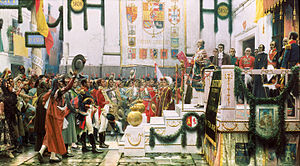Treaty of Puerto del Rey: Difference between revisions
(Created page with "{{Infobox constitution | document_name =Treaty of Puerto del Rey | image =File:Cortes_de_cadiz.jpg | image_alt = | caption = Ch...") |
No edit summary |
||
| Line 66: | Line 66: | ||
==Proposed amendments== | ==Proposed amendments== | ||
===Reform of the Council of the States=== | ===Reform of the Council of the States=== | ||
[[Category:Auratia]] [[Category:Politics]] | |||
Revision as of 03:56, 26 May 2020
| Treaty of Puerto del Rey | |
|---|---|
 Christian X depicted descending from his throne to sign the treaty, 13 January 1820. | |
| Original title | Tratado de Puerto del Rey |
| Jurisdiction | Auratia |
| Created | 7 September 1819 |
| Presented | 18 November 1819 |
| Ratified | 13 January 1820 |
| Date effective | 16 February 1820 |
| System | de jure semi-presidential de facto parliamentary federal democractic republic |
| Branches | Three (Legislative, Executive, Judicial) |
| Head of state | President, elected by the governors of the States |
| Chambers | Bicameral Auratian Senate: Assembly of the People (lower house) and Council of the States (upper house) |
| Executive | Commonwealth Cabinet, headed by the Premier |
| Judiciary | Supreme Court, Appeals courts, and District courts |
| Federalism | Federation |
| Electoral college | No |
| Entrenchments | 3, 1 still active |
| Amendments | 11 |
| Last amended | 1994 |
| Location | Auratian National Archives |
The Treaty of Puerto del Rey, more often referred to as the Constitution of Auratia is the supreme law and establishing document of the Commonwealth of Auratian Catholic States. The treaty was introduced on 18 December 1819 and ratified on 13 January 1820 by King Christian IX and the Provisional Senate. The Treaty of Puerto del Rey is among the oldest constitutions written in Euclea. The ratificiation of the Treaty of Puerto del Rey and the ascension of republicanism are celebrated on Commonwealth Day (Auratia)#Commonwealth Day.
In 1817, the Alzamiento, a populist republican revolution against the monarchy began. Inspired by radical changes in Auratia's neighbors, such as Etruria, many of the Alzamiento's leaders invisaged a republican government to govern the country. By August 1819, revolutionary forces led by Pablo Obrador has captured Puerto del Rey, the kingom's capital, and held King Christian IX hostage. It was during this time that the Provisional Senate was formed, and a special committee was created to draft a treaty to end conflicts between pro-monarchist and pro-republican factions. The Treaty of Puerto del Rey was presented in its original form to the Provisional Senate on 18 November 1819, where it was debated and voted on. The treaty was then negociated with Christian IX and his representatives. Finally, the Treaty of Puerto del Rey was ratified on 13 January 1820. It would only formally enter into force on 16 February, when Enrico Pía was made the first president of Auratia.
The majority of the treaty's text touches on the abdication of the monarchy, privileges of the formal nobility, and the transition into republican government. As such, most the treaty's provisions have expired. The parts of the treaty still revalent today are contained in Articles IV and V, which touch on the functions of the federal government, as well as the relationship between the federal government and the States.
The Treaty of Puerto del Rey has only been amended eleven times, with the last amendment being ratified in 1994 to allow the country to join the Euclean Community. The treaty is notoriously difficult to amend, as all of Auratia's eight states must agree to ratify the amendment for it to enter into force.